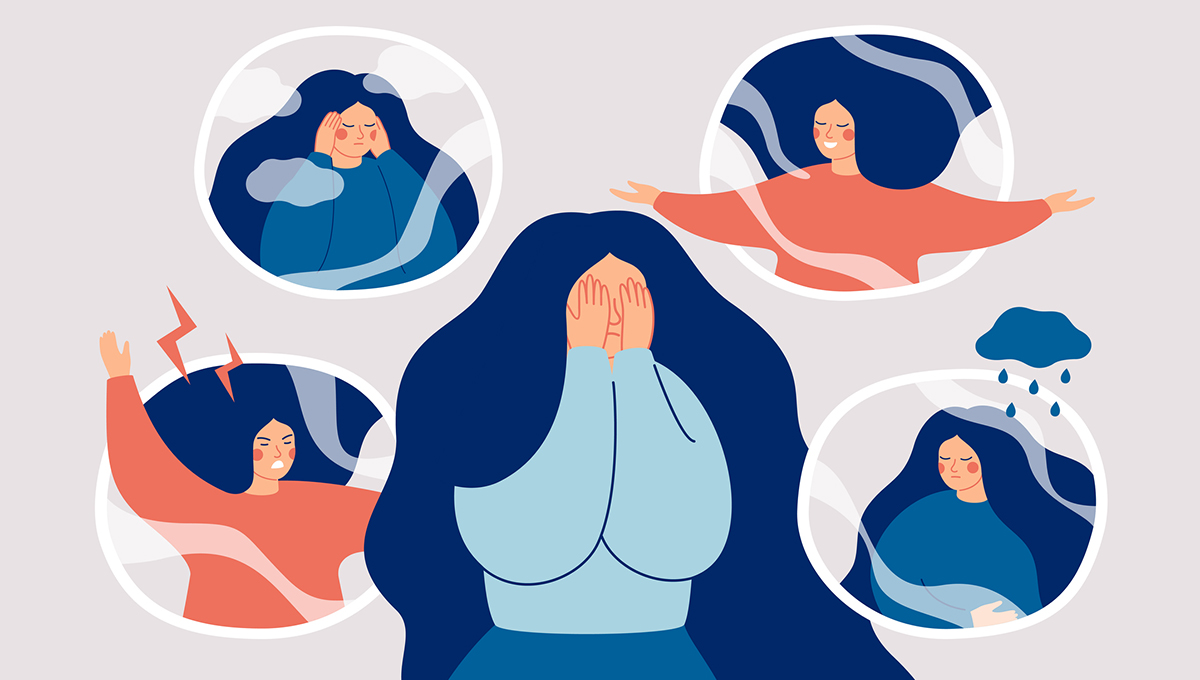
Those with personality disorders are often painted in books, movies, TV shows, and even news articles as unstable, manipulative, cold/calculating, and even “evil.” While a logical and rational person knows there is more nuance involved, the myths of personality disorder are still pervasive in modern society. These myths are dangerous and harmful to sufferers of personality disorders (PD), especially those with substance use disorder (SUD), which often go hand in hand.
A sufferer of these comorbid diseases might be even more reticent to acquire help due to the negative stigma surrounding their ailments, exacerbating both diseases exponentially. If left untreated, personality disorder, coupled with addiction, can have disastrous (and sometimes fatal) results. To combat this stigma, it is important to understand these diseases, their symptoms, their treatments/drug therapies, and how to get help for yourself or a loved one in a judgment-free environment.
What Is Personality Disorder?

A personality disorder (PD) is the umbrella term for ten specific diagnoses. While each disorder has similarities, it is important to note that not all are the same and different therapies/medicines are used uniquely to treat the patient, especially when coupled with SUD. To understand the different types, let us look at the different “clusters” medical science has organized to explain each personality disorder in the spectrum.
Cluster A
Cluster A is primarily composed of paranoid or schizotypal personality disorders on the spectrum.
They include:
- Paranoid personality disorder (PPD). This disease makes people suspicious or leery of other people, which can in turn negatively affect interpersonal relationships. Because they often feel targeted or attacked, they will withdraw from society/social interaction and self-isolate. Some might attack physically or verbally without a readily understandable cause. This hostility is because the disorder takes even the most benign or non-negative comments and “twists” them in a PPD person’s brain to be received as malicious or negative.
- Schizotypal personality disorder (SPD). This is a more intense version of paranoid personality disorder with delusions that their thoughts/actions are omnipotent or, conversely, can be affected by others. While not guaranteed, some afflicted by this personality disorder often have visual or auditory hallucinations that feed into their overall delusion of grandeur. Because of the awkward external manifestations of those suffering from schizotypal personality disorder, many will avoid those with this illness, causing reactive or preemptive isolation in the sufferer.
- Schizoid personality disorder (SZPD). Extreme isolation is a hallmark of this personality disorder in Cluster A and those who are burdened with it will be seen as “loners,” having little to no interaction with the outside world. While this might be seen as agoraphobic (a phobia of people/social situations), it is generally a self-isolation that is not fear/anxiety-based but rather from a genuine inability to engage with others socially or emotionally.
Cluster B
If viewed on a spectrum where Cluster A is at one end, Cluster B would be at the complete opposite end of the spectrum. While isolation and paranoia are hallmarks of Cluster A, Cluster B is generally defined as someone who is exceedingly emotive, impulsive, and sometimes reckless.
- Antisocial personality disorder (ASPD). Someone with ASPD will never admit fault, even if they are completely in the wrong. If someone with ASPD apologizes, it is likely not sincere and just a means to eradicate the conflict — they feel little to no remorse for their actions. They will also wholly disregard other people’s emotions and often engage in risk-taking, impulsive behavior, regardless of harm to themselves or others.
- Histrionic personality disorder (HPD). Based upon context, the name of this disorder can tell you that a sufferer of this condition is someone who seeks out drama/conflict, especially when it puts them at the center of it all. They often find and engage in this drama without any regard for the social or emotional state of others. Without this craved attention, someone with histrionic personality disorder might become depressed or sullen, which negatively impacts interpersonal relationships further. The drama, in and of itself, is an addiction.
- Narcissistic personality disorder (NPD). This disorder’s name is derived from the mythic Greek demigod, Narcissus, who fell in love with his own reflection. Narcissistic persons, eponymously, have an inflated sense of self and will often seek achievement and fame relentlessly. While this seems a positive trait on its face, those with narcissistic personality disorder will try to achieve their goals without any regard for others. If their self-perceived “greatness” is not acknowledged and praised, they can and will often spiral into destructive actions both to themselves and others, but more often others (as their self-love is too great to do harm to themselves).
- Borderline personality disorder (BPD). BPD, while certainly the most recognizable by society, is not always the most accurate diagnosis for a person. To have BPD, one needs to have extreme mood swings and an “all or nothing” view of themselves — there are no middle-ground opinions of oneself for someone with BPD because they view themselves as either perfect or horrible. This view can change their overall mood and manifest itself as anger, depression, and/or impulsive/risk-seeking behavior.
Cluster C
Cluster C is the last cluster under the umbrella term of “personality disorders,” and is primarily focused on fear or anxiety-based disorders.
- Avoidant personality disorder (AVPD). This disorder is based upon the belief of the sufferer that they are not liked/loved by others or not “good enough.” Their feelings of intense insufficiency or inadequacy often express as an unwillingness to engage with others or develop interpersonal relationships for fear of rejection or negative criticism.
- Dependent personality disorder (DPD). Where someone with avoidant personality disorder will never seek out friendships or relationships, a person with dependent personality disorder will need them urgently. They will often seek out those in caretaker positions (e.g. nurses, doctors, teachers, or those with children) for obvious reasons. They will often “chameleon” to become the most agreeable person to those they attach to, forgoing their own emotional, mental, and physical needs for what they perceive the other person wants. Sense of self and independence is not important at all to someone with DPD.
- Obsessive-compulsive disorder (OCD). OCD is another on the list that has a high “visibility” in modern society, often depicted as someone who counts things or needs things to be excessively clean. While these are certainly symptoms one might experience with OCD, overall, the disease is hallmarked by a need for order, tasks, and schedules – the end goal of someone with OCD is to have complete control over one’s own life. They often have a very obdurate view of things and are not easily swayed to other modes of doing things, which can drive many people away from them.
What Is the Correlation Between Personality Disorders and Substance Use?

According to the National Library of Medicine, around 10% to 14.8% of people suffer from PD and about 34.8% to 73.0% of patients treated for dependency also have PD. What this means is that people with PD are much more likely to “self-medicate” or use drugs/alcohol as a means of controlling, coping, or suppressing symptoms. While this might appear to work in the short term, the long-term physical and emotional detriment to the person is why treating both PD and SUD concurrently is so important to medical professionals.
What Personality Disorders Are Most Commonly Comorbid With Substance Use Disorders?
While all persons with personality disorders are certainly at risk for “self-medication” or addiction behaviors/actions, there are certain subsets in the spectrum that have a higher rate of addiction and personality disorder comorbidity. “Borderline PD and antisocial PD are particularly found to be associated with SUDs,” says the National Library of Medicine in their study “Comorbidity of Personality Disorder among Substance Use Disorder Patients: A Narrative Review.”
There is also a correlation between type/quality of treatment of the PD versus the likelihood of SUD in a patient. If a patient is not given the right treatment plan for the PD, they are more likely to turn to illicit substances to “fix” themselves.
What Drugs Treat Personality Disorders?
It is often the first question people ask: “Is there a drug to treat this?” This is a normal reaction because medical science has brought us a host of pharmacological options to help with many diseases that were erstwhile a mystery to treat for doctors historically.
While medicine is absolutely a helpful option used by psychiatrists and other medically licensed professionals to treat PD, it is important to note that it is not the only method, nor is it a “cure-all” route.
Medicines/drugs should, ideally, only be used to control acute symptoms and manage more prevalent, long-term symptoms under strict doctor observation. Other therapies, such as psychotherapy and behavioral therapy, are far more important and beneficial to the treatment of a person suffering from PD. While it is possible to only receive therapy to handle PD and forgo medicines, it is not possible to only use medicine and not be under the care of a licensed professional in therapy for PD and achieve any beneficial results.
Does Abuse Cause Personality Disorders?
To answer a question with a question: “What type of abuse?” If one is talking about substance use and whether it causes PD in people, the answer is a resounding no. Abuse of drugs and alcohol is not the cause of personality disorders, but it can be a factor in the development of PD, as well as its effects.
Abuse in the form(s) of physical, sexual, mental, or emotional, especially in children, may or may not manifest later as a PD in a person. While there is no definitive answer, there is a link
between abuse (especially in children) and personality disorders later in life, where those with PD have reported abuse in their childhoods. The science is still inconclusive as to which came first, the PD or the abuse, and requires more study to understand thoroughly. If you suffer from PD and have also suffered from abuse at any point in your life, it is important to address this with your medical care professional immediately, as it does shape your care plan.
Get Co-occurring Disorder Help at Maryland Recovery

At Maryland Recovery, we are committed to treating not only those with SUD, but also those who are afflicted with personality disorders. A dual diagnosis is an extremely complex situation but most especially in personality disorders like antisocial personality disorder (ASPD) and addiction. Because of this, many treatment centers are ill-equipped to deal with both diagnoses in tandem and often only focus on the SUD.
For this reason, only programs equipped with the expertise to handle comorbidity of personality and co-occurring addiction disorders are recommended. At Maryland Recovery, we have that expertise and knowledge to treat individuals with a dual diagnosis. We are committed to creating personal and unique care programs for each patient, treating them rather than their afflictions, in a compassionate, empathetic, and safe environment.
For more information on how you or a loved one can start a customized care plan today, please contact us anytime by getting in touch with our Addiction Treatment Team. We are here to answer any questions you have 24/7.
Reviewed by Christopher Schwartfigure MS, LGPC, CAC-AD








